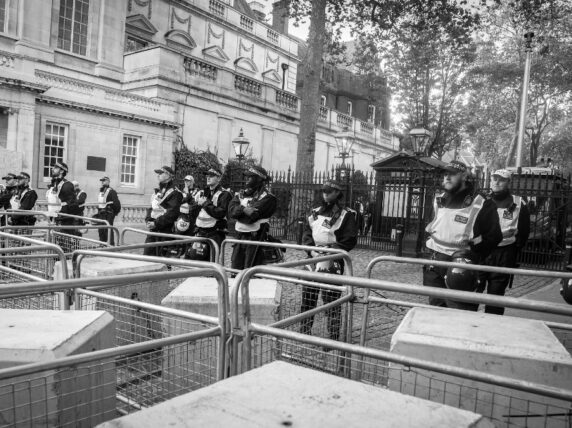It’s time to shake up coalition campaigning
As a loose, leaderless alliance of over 350 organisations, the campaign against the Police, Crime, Sentencing and Court (PCSC) Bill took sector-wide campaigning into uncharted territory.
The PCSC Bill arrived in March last yearwith little warning and huge implications. Over 300 pages long, the Bill represented a serious assault on our rights and freedoms, in particular the right to protest and criminalising Gypsy and Traveller communities’ way of life.
Five organisations – Liberty, Friends of the Earth, Quakers in Britain, Friends, Families & Travellers and Bond – established the Police Bill Alliance (PBA) to campaign against parts of the Bill, and formed the core group that coordinated the campaign.
The PBA sought to have Parts 3 (on protest) and Part 4 (on criminalising trespass) removed from the Bill. When that was no longer feasible, we pushed for amendments that would mitigate some of the worst impacts of the Bill.
We successfully stopped some of the most authoritarian measures to curb protest, and increased awareness of the impact on Gypsy and Traveller communities.
The Alliance deliberately pursued an unconventional approach to joint campaigning. Here is what we did and some of the lessons we learnt.
A loose governing framework focused on guiding, not dictating, direction
Working behind the scenes, the core group created the space to critically engage with ideas, share the workload and provide mutual support. There was a steadfast commitment to joint decision-making with a recognition that each organisation brought different skills, insight and resources.
The lack of a leader helped us operate successfully over the 14 months of the campaign as we were not reliant on one individual or organisation’s reputation, capacity or energy.
Thanks to funding from the Joseph Rowntree Charitable Trust and Joseph Rowntree Reform Trust, we were able to bring in additional capacity and specialist skills in convening, communications and public affairs. Information sharing and planning took place through two working groups, one focused on parliamentary activity and the other on mobilisation and storytelling. The informal nature of the groups meant that people could opt in and out at different times as capacity allowed, which enabled a diverse mix of organisations to participate.
Putting the goal above identity and brand made the campaign more flexible
As an informal alliance, the PBA made the conscious decision not to lead with the campaign name or logo, nor for one organisation to front the campaign.
Subscribe to our newsletter
Our weekly email newsletter, Network News, is an indispensable weekly digest of the latest updates on funding, jobs, resources, news and learning opportunities in the international development sector.
Get Network NewsThis enabled us to employ an array of tactics and activities that not all organisations would usually participate in, such as a lively petition hand-in or supporting former senior police officers to make media interventions, and allowed campaign members to use different messages that others in the Alliance may have been uncomfortable with.
As a result the PBA was able to amplify actions and messages that resonated with very different people.
Invest time in your base and allies
To help our allies understand the issues, thecore group produced a range of resources that they could use as they wished. Joint parliamentary briefings highlighted the scale and diversity of concerns and we encouraged organisations that were less involved or less confident on specific policy points to use the key messaging documents we regularly updated.
The PBA also worked with a convenor who reached out to smaller organisations to ensure they were up to speed and felt empowered to participate in the campaign. We reached out to infrastructure groups to amplify complementary, but different voices. Unfortunately, though, we were less successful in gaining unusual allies, such as campaign groups, that resonate with Conservative MPs.
Active solidarity with marginalised groups underpinned our approach
Part 4 of the Bill criminalises trespass and will have a hugely damaging impact on Gypsy and Traveller communities in the UK. We knew from the start that the needs of these communities should be at the heart of the campaign, but there was always a risk that Part 3 (on protest) risked overshadowing Part 4 in terms of profile.
Friends, Families and Travellers’ participation in the core group helped mitigate against this to a degree, as did actively holding space in the working groups for Part 4 and supporting related grassroots actions organised outside the campaign. While we rightly deferred to Friends, Families and Travellers on Part 4, this placed significant pressure on them.
Even though the core group was clear that we needed to stand in solidarity with Gypsy and Traveller communities, it was challenging to galvanise the broader alliance behind Part 4. It became even harder to keep the issues in the public eye after we lost the final Lords vote on Part 4 by a single vote in December.
Complement, don’t undermine, grassroots action
A huge number and range of activists, groups, networks and organisations were seeking to either stop or amend different aspects of the Bill, from large household names like Christian Aid to grassroots groups such as Sisters Uncut and Drive2Survive.
The PBA recognised that as civil society organisations who have particular ways of working it was important that their advocacy did not inadvertently undermine the grassroots.
As such, we consciously chose to avoid language that could feed into the frame of “good” or “bad” protesters, instead speaking about the motivations for people’s need to protest in the context of inaction from the government. This became especially important after the Insulate Britain protests.
Resilience is both a necessity and a victory in itself
An 80-seat government majority and packed media agenda meant gaining traction was a perpetual challenge. The busy parliamentary agenda led to sessions being regularly rescheduled, making it difficult for us to plan influencing activity. Many PBA members were also simultaneously working across other pieces of complex legislation, such as the Elections Bill.
Sheer tenacity was required to maintain momentum over an extended time both inside the coalition and externally with supporters, media and parliamentary champions. In the face of complex challenges, our resilience demonstrated to the government that it could not easily take away our rights or criminalise marginalised communities without opposition.
What comes next
The PCSC Bill may be over, but it remains vital that civil society continueto stand together in solidarity and find new ways of working across divides if we’re going to achieve the change we want to see in our communities. Maintaining our rights and freedoms depends on it.
We hope that others can learn from our campaign and are better equipped to stand up for the issues they believe in because of it.
Category
News & Views



